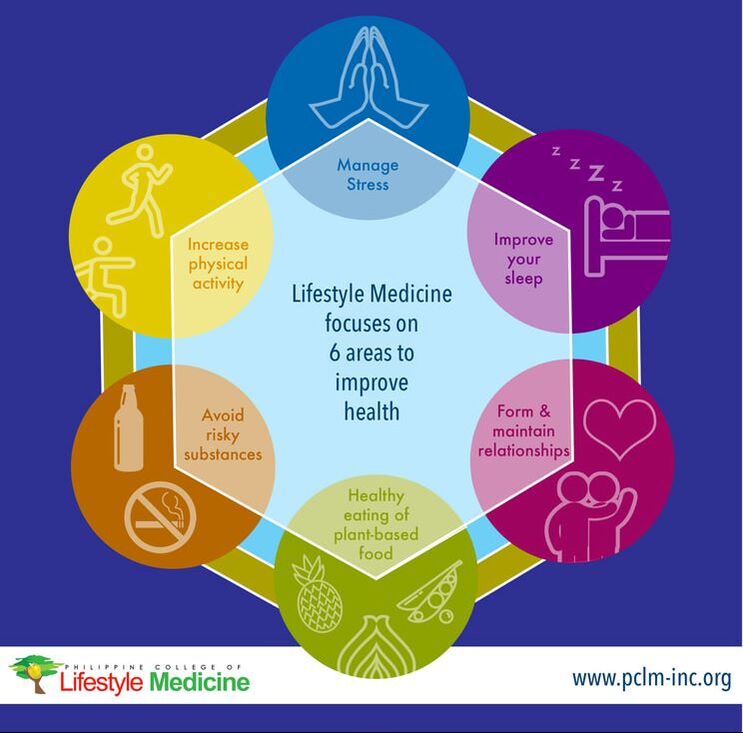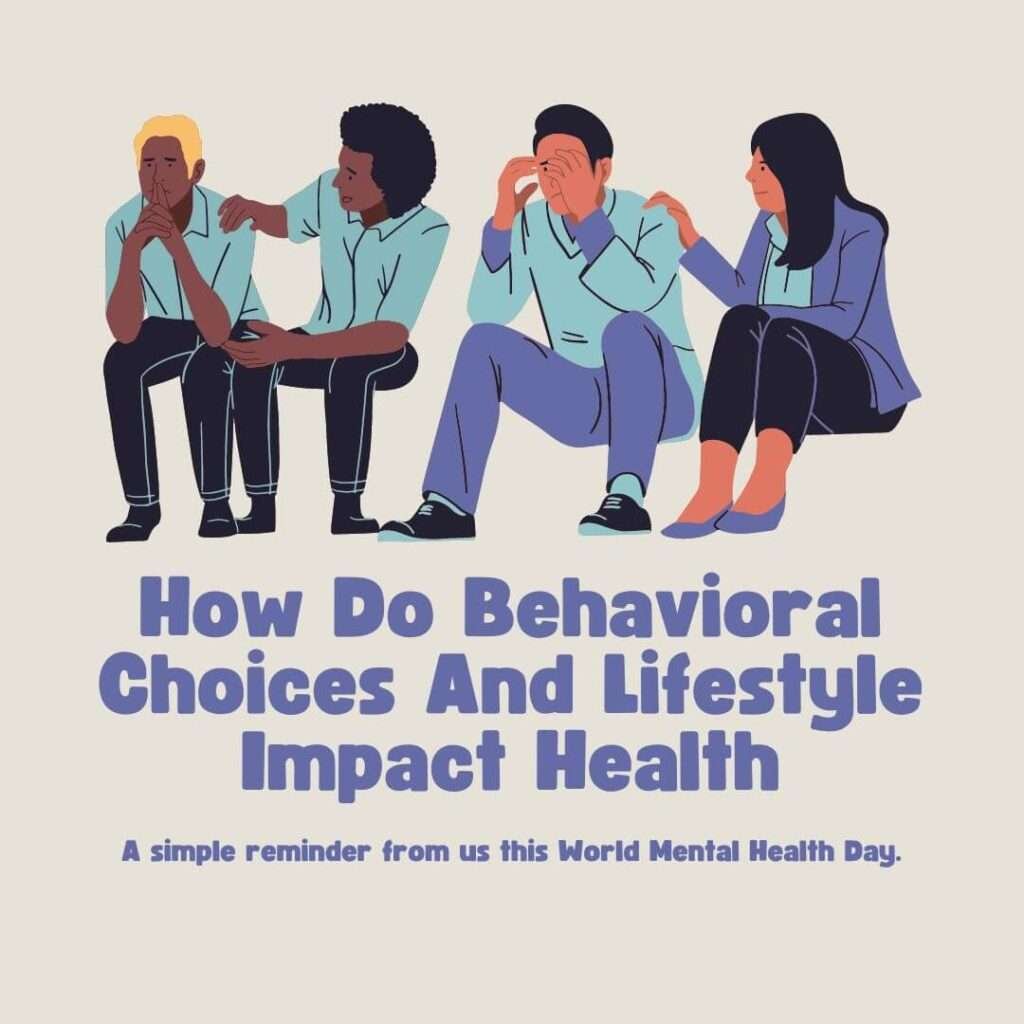How Do Behavioral Choices And Lifestyle Impact Health: Behavioral choices and lifestyle directly impact health by influencing disease risk and overall well-being. Making healthy choices like regular exercise and balanced nutrition can improve health outcomes significantly.

Credit: health.mil
Conversely, unhealthy habits such as smoking and excessive alcohol consumption can lead to various health issues. It is essential to recognize the profound connection between our daily choices and long-term health. By prioritizing a healthy lifestyle, individuals can proactively manage and enhance their overall health and well-being.
Making informed decisions and adopting positive behaviors can pave the way for a healthier and happier life. This holistic approach emphasizes the importance of lifestyle modifications in promoting optimal health and preventing chronic diseases.
Related Post: Food Photography Styling Tips: Elevate Your Culinary Shots!
Introduction To Behavioral Choices And Health
When it comes to overall health and well-being, behavioral choices and lifestyle play a pivotal role. The decisions we make in our daily lives, from what we eat to how active we are, can significantly impact our physical and mental health. Understanding the connection between lifestyle and well-being and recognizing the importance of personal choices in health is crucial for making informed decisions that promote a healthier and more fulfilling life.
The Connection Between Lifestyle And Well-being
Our lifestyle directly influences our well-being, encompassing factors such as diet, physical activity, stress management, and sleep patterns. Making healthy choices in these areas can lead to improved energy levels, better mental clarity, and reduced risk of chronic diseases. Conversely, poor lifestyle habits can contribute to weight gain, fatigue, and heightened susceptibility to health issues.
Importance Of Personal Choices In Health
Personal choices are integral to maintaining optimal health. By prioritizing a balanced diet, regular exercise, and stress-reducing activities, individuals can take proactive steps towards preventing illnesses and enhancing their overall quality of life. Small yet impactful changes in lifestyle can yield long-term health benefits, emphasizing the significance of mindful decision-making.
Dietary Habits And Nutritional Impact
Dietary habits play a crucial role in determining an individual’s overall health and well-being. The nutritional impact of these habits extends beyond mere sustenance, influencing the body’s ability to function optimally and combat illness. Understanding the significance of dietary choices is essential for promoting a healthy lifestyle and preventing various health conditions.
Balanced Diet And Disease Prevention
A balanced diet comprising a variety of nutrients is vital for disease prevention. Including a diverse range of fruits, vegetables, whole grains, lean proteins, and healthy fats ensures that the body receives essential vitamins, minerals, and antioxidants. These components work synergistically to bolster the immune system and protect against chronic diseases such as heart disease, diabetes, and certain cancers.
Consequences Of Unhealthy Eating Patterns
Unhealthy eating patterns can lead to a myriad of adverse health effects. Consistently consuming processed foods high in sugar, saturated fats, and sodium can contribute to weight gain, elevated cholesterol levels, and increased risk of cardiovascular complications. Inadequate intake of essential nutrients may result in weakened immunity, impaired cognitive function, and heightened susceptibility to various infections.
Physical Activity: A Pillar Of Health
Physical activity is a key pillar of health, with the power to significantly impact our overall well-being. The choices we make in terms of exercise and physical movement have a direct correlation to our health outcomes. Let’s explore the benefits of regular exercise and the risks associated with a sedentary lifestyle.
Benefits Of Regular Exercise
Regular exercise offers a multitude of benefits, contributing to enhanced physical and mental well-being. It improves cardiovascular health, strengthens muscles, and aids in weight management. Additionally, exercise promotes better sleep, reduces stress, and enhances mood, leading to a more positive outlook on life. Engaging in physical activity also supports cognitive function and helps to reduce the risk of chronic diseases such as diabetes and certain types of cancer.
Risks Of Sedentary Lifestyle
A sedentary lifestyle, characterized by prolonged periods of sitting or physical inactivity, poses significant risks to health. It can contribute to obesity, cardiovascular disease, and muscular atrophy. Furthermore, a lack of physical movement can lead to mental health challenges such as anxiety and depression. Prolonged sitting has also been linked to an increased risk of developing conditions like type 2 diabetes and certain types of cancer.

Credit: www.pclm-inc.org
Sleep Quality And Its Effects
Discover how lifestyle choices impact sleep quality, influencing overall health. Incorporating healthy habits like regular exercise and a balanced diet can enhance sleep patterns, leading to improved well-being and vitality. Making mindful behavioral choices positively affects your sleep and overall quality of life.
Sleep is a vital part of our daily routine, and it plays a crucial role in maintaining our overall health. Sleep quality refers to the depth, duration, and consistency of sleep. Poor sleep quality can lead to a range of health issues, while adequate rest can have numerous benefits. In this section, we will explore the effects of sleep quality on our health and well-being.
Sleep Deprivation And Health Risks
Sleep deprivation is a condition that occurs when an individual fails to get adequate sleep. Chronic sleep deprivation can lead to several health risks, including:
- Increased risk of obesity
- Increased risk of diabetes
- Increased risk of heart disease
- Increased risk of stroke
- Increased risk of depression and anxiety
- Impaired immune system function
These health risks can have long-term consequences for an individual’s health and well-being. Therefore, it is crucial to prioritize sleep and ensure adequate rest.
Advantages Of Adequate Rest
Getting adequate rest can have numerous benefits for our health and well-being, including:
- Improved memory and cognitive function
- Reduced risk of obesity
- Reduced risk of diabetes
- Reduced risk of heart disease
- Reduced risk of stroke
- Improved mood and mental health
- Improved immune system function
These benefits demonstrate the importance of sleep quality in maintaining our overall health and well-being. Therefore, it is essential to prioritize sleep and make sure we get adequate rest each night. In conclusion, sleep quality plays a crucial role in maintaining our overall health and well-being. Poor sleep quality can lead to several health risks, while adequate rest can have numerous benefits. Therefore, it is crucial to prioritize sleep and ensure we get adequate rest each night.
Substance Use And Abuse
Behavioral choices and lifestyle greatly impact health outcomes, including substance use and abuse. Making positive decisions can lead to improved well-being and overall health. Conversely, unhealthy habits can contribute to long-term health issues and complications.
Substance Use and Abuse is a major contributor to poor health outcomes worldwide. The impact of tobacco, alcohol, and drugs on individual health is significant. Behavioral choices and lifestyle factors play a crucial role in the development of substance use disorders. The harmful effects of substance abuse are not limited to physical health, but they also affect mental and social well-being. In this section, we will discuss the impact of tobacco, alcohol, and drugs on health, as well as the strategies for prevention and recovery.
Impact Of Tobacco
Tobacco use is a leading cause of preventable illness and death worldwide. Smoking cigarettes can cause cancer, heart disease, and respiratory problems. It is not only harmful to the smoker but also to the people around them. Second-hand smoke can lead to lung cancer, asthma, and other respiratory diseases. Smoking during pregnancy can cause low birth weight, premature birth, and sudden infant death syndrome (SIDS). Quitting smoking can significantly reduce the risk of developing smoking-related diseases.
Impact Of Alcohol
Alcohol abuse can lead to liver disease, cancer, cardiovascular disease, and mental health problems. Heavy drinking can increase the risk of accidents, violence, and injuries. Alcohol use during pregnancy can cause fetal alcohol syndrome (FAS), which can lead to physical and mental disabilities in the child. Moderate drinking may have some health benefits, but excessive drinking is harmful and can cause severe health problems.
Impact Of Drugs
Drug abuse can cause both short-term and long-term health problems. It can lead to addiction, overdose, and death. Drug abuse can cause heart disease, stroke, cancer, and mental health problems. Injecting drugs can lead to HIV and other infections. The use of opioids, including prescription painkillers and heroin, has become an epidemic in many parts of the world. Substance abuse affects not only the individual but also their families and communities.
Strategies For Prevention And Recovery
Preventing substance abuse requires a comprehensive approach that includes education, public health policies, and community-based interventions. Prevention strategies may include educating young people about the risks of substance abuse, enforcing laws that regulate the sale and distribution of tobacco, alcohol, and drugs, and providing treatment and support for those who need it. Recovery from substance abuse requires a combination of medical treatment, behavioral therapy, and support from family and friends. Treatment may include medication-assisted treatment, counseling, and support groups. In conclusion, substance use and abuse have a significant impact on health outcomes. The harmful effects of tobacco, alcohol, and drugs on physical, mental, and social well-being are well established. Preventing substance abuse requires a comprehensive approach, and recovery from substance abuse requires a combination of medical treatment and support from family and friends. It is essential to promote healthy behaviors and lifestyle choices to prevent substance abuse and improve overall health outcomes.
Stress Management And Mental Health
Stress management plays a crucial role in maintaining good mental health. The way we handle stress and the lifestyle choices we make can significantly impact our overall well-being. Understanding the effects of chronic stress and learning effective techniques for coping with it are essential for maintaining a healthy mind and body.
Effects Of Chronic Stress
Chronic stress can lead to a myriad of health issues, including anxiety, depression, and weakened immune function. It can also contribute to the development of heart disease, diabetes, and digestive problems. Moreover, chronic stress has been linked to an increased risk of insomnia and chronic fatigue.
Techniques For Coping With Stress
Implementing mindfulness and meditation practices can help alleviate stress and promote mental well-being. Engaging in regular physical activity and prioritizing adequate sleep are also crucial for managing stress. Additionally, establishing healthy boundaries and seeking support from loved ones can contribute to a balanced lifestyle and improved mental health.
Social Connections And Community
Social connections and community play a crucial role in shaping individual health and well-being. The influence of relationships and social support within a community can have a profound impact on an individual’s physical and mental health.
Influence Of Relationships On Health
Positive and supportive relationships have been shown to have a direct correlation with improved overall health. Individuals who maintain strong social connections tend to experience lower levels of stress and anxiety, leading to better cardiovascular health and immune function.
Role Of Social Support In Well-being
Social support from friends, family, and community members can act as a buffer against the negative effects of stress. This support system can provide emotional reassurance, practical assistance, and a sense of belonging, all of which contribute to improved mental well-being and resilience.
Preventive Healthcare And Regular Check-ups
Preventive healthcare and regular check-ups play a crucial role in maintaining overall health and well-being. Making behavioral choices and lifestyle changes can have a significant impact on an individual’s health. By prioritizing preventive care, individuals can take proactive steps to identify and address health issues before they escalate. In this article, we will explore the importance of early detection, vaccinations, and health maintenance in preventive healthcare and regular check-ups.
Importance Of Early Detection
Early detection of health issues can lead to more effective treatment and better outcomes. Regular screenings and check-ups enable healthcare providers to identify potential health concerns in their early stages, allowing for timely intervention and management.
Vaccinations And Health Maintenance
Vaccinations are a critical aspect of preventive healthcare, as they help safeguard individuals from various infectious diseases. Regular health maintenance, including maintaining a balanced diet, staying physically active, and managing stress, contributes to overall wellness and can reduce the risk of chronic conditions.
Environmental Factors And Personal Health
Environmental factors play a crucial role in personal health, with behavioral choices and lifestyle directly impacting overall well-being. From diet and exercise to stress management, these factors influence health outcomes significantly. Making positive lifestyle changes can lead to improved health and well-being in the long run.
Exposure To Pollutants And Toxins
Environmental factors play a crucial role in shaping personal health. Exposure to pollutants and toxins can have a significant impact on our well-being. Air pollution, chemicals in water, and harmful substances in food can all contribute to health issues.
Creating A Healthy Living Space
Designing a healthy living space is essential for overall well-being. Adequate ventilation, natural light, and the use of non-toxic materials are key elements. Incorporating plants can help improve air quality and create a calming environment.
Personal Responsibility And Health Education
When it comes to personal health, individuals hold a significant responsibility in making informed decisions about their lifestyle choices. Health education plays a crucial role in empowering individuals to understand the impact of their behaviors on their overall well-being.
Making Informed Health Decisions
Empowering individuals to make informed health decisions involves providing them with the necessary knowledge and skills to assess the consequences of their actions.
Role Of Health Literacy
Health literacy is essential as it enables individuals to understand health information, make informed choices, and actively participate in their healthcare decisions.
Conclusion: Integrating Lifestyle Changes For Better Health
Opting for healthy lifestyle choices can significantly impact overall well-being. Incorporating regular exercise, a balanced diet, and stress management techniques can lead to improved health outcomes. Making mindful behavioral decisions can pave the way for a healthier and more fulfilling life.
Summarizing Key Lifestyle Adjustments
Healthy lifestyle choices impact overall well-being significantly.
Regular exercise, balanced diet, adequate sleep are essential.
Avoiding smoking, limiting alcohol intake promotes better health.
Adopting stress-management techniques improves mental and physical health.
Small changes in daily habits lead to lasting health benefits.
Empowerment Through Healthy Choices
Empowering individuals to take control of their health.
Encouraging mindful eating, active living, and stress reduction techniques.
Personalized health plans enhance motivation and success rates.
Encouraging support networks and resources for sustainable lifestyle changes.

Credit: study.com

Credit: study.com
Frequently Asked Questions
How Does Behavioural Factors Affect Health?
Behavioral factors such as diet, exercise, and stress management directly impact physical and mental health. Healthy behaviors can reduce the risk of chronic diseases and improve overall well-being. Conversely, unhealthy habits may lead to illness and decreased quality of life.
What Lifestyle Behaviors Have An Impact On Health?
Healthy lifestyle behaviors, such as regular exercise, balanced diet, adequate sleep, and stress management, greatly impact overall health. Making these choices can reduce the risk of chronic diseases and improve physical and mental well-being.
How Does Lifestyle Behaviours Impact On Health And Illness?
Lifestyle behaviors can significantly impact a person’s health and illness. Unhealthy habits such as smoking, excessive alcohol consumption, lack of physical activity, and poor diet can increase the risk of various illnesses such as heart disease, diabetes, and cancer. On the other hand, adopting healthy habits like regular exercise, healthy eating, and stress management can improve overall health and reduce the risk of chronic diseases.
How Might Your Behaviors Today Affect Your Health?
Your behaviors today can have a significant impact on your health. Healthy choices, such as regular exercise and a balanced diet, can improve your physical and mental well-being. Unhealthy habits, such as smoking and excessive drinking, can increase your risk of various health problems, including cancer, heart disease, and liver disease.
It’s essential to prioritize your health and make positive choices to promote a healthy lifestyle.
Conclusion
Understanding how our daily choices affect our health is crucial for overall well-being. By making informed decisions regarding behavior and lifestyle, we can positively impact our physical and mental health. Small changes can lead to significant improvements in long-term health outcomes.
Prioritizing healthy habits is key to a thriving life.


